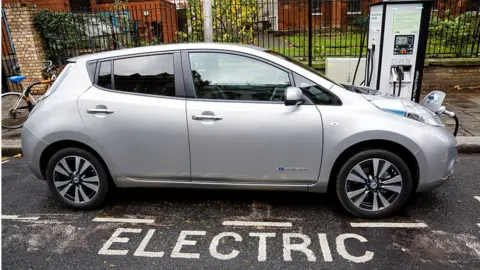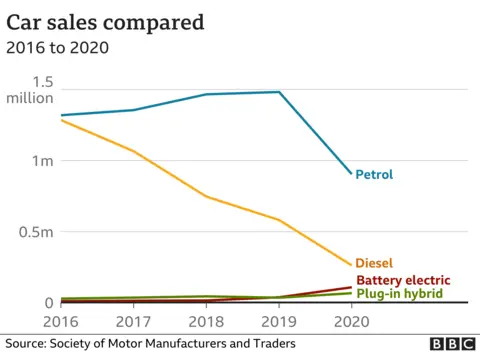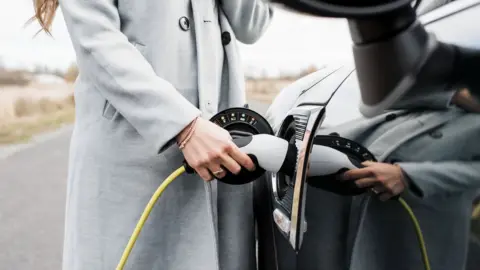Backlash grows against cut to electric car grants
 Getty Images
Getty ImagesThe government is to cut grants aimed at encouraging people to buy electric vehicles in a move that has been criticised by the motor industry.
The Department for Transport will reduce the grant from £3,000 to £2,500 and restrict it to cars under £35,000.
But Society of Motor Manufacturers and Traders (SMMT) said it is "the wrong move at the wrong time".
It said the decision goes against the government's zero emissions ambitions.
"This sends the wrong message to the consumer, especially private customers, and to an industry challenged to meet the government's ambition to be a world leader in the transition to zero emission mobility," said SMMT chief executive Mike Hawes.
Ford of Britain said the grant cut was "disappointing and is not conducive to supporting the zero emissions future we all desire."
"Robust incentives - both purchase and usage incentives - that are consistent over time are essential if we are to encourage consumers to adopt new technologies," the carmaker's chairman Graham Hoare said.
Business group the CBI also criticised the move, saying "this is the wrong time to stunt a green recovery by making a sudden change to the grants on offer."
Matthew Fell, CBI chief UK policy director, said "we must avoid sending mixed messages to consumers and businesses."
"Switching to an electric vehicle still has many barriers, including high upfront costs and availability of reliable charging points.
"A clear and consistent pathway for incentives will ensure business can continue to deliver the government's ambitions for reducing transport emissions," Mr Fell added.

'Increasing choice'
The government said that higher-priced vehicles are typically bought by drivers who can afford to switch to electric vehicles without a subsidy.
It said the changes will allow funding for the grant to go further.
Transport minister Rachel Maclean said: "We want as many people as possible to be able to make the switch to electric vehicles."
"The increasing choice of new vehicles, growing demand from customers, and rapidly rising number of chargepoints means that while the level of funding remains as high as ever, given soaring demand, we are re-focusing our vehicle grants on the more affordable zero emission vehicles."
The government will also alter how it calculates the plug-in van grant, and change the eligibility for the grant to vehicles that are able to travel for 60 miles without any emissions.
The plug-in car grant was introduced a decade ago, and was designed to reduce the price of electric cars, which generally cost more to make than petrol or diesel equivalents, to encourage more people to buy them.


Electric cars are expensive to make and expensive to buy compared with traditional vehicles.
The grant was introduced to reduce the price difference between electric models and conventional cars, to encourage people to buy them.
The government's argument is that now battery prices are falling, and with a range of cheaper cars coming onto the market, the size and scope of the grant can be reined in, and the available money can be better spent.
The market has certainly changed since the grant was introduced a decade ago. Electric car sales are now rising rapidly and relatively affordable vehicles with a practical range are becoming much more common.
With the government now planning to ban the sale of new non-hybrid petrol and diesel cars from 2030, it seems to be relying less on incentives and more on compulsion to bring about change.
Less carrot and more stick.
But the industry believes this approach is wrong and that reducing the grant threatens to choke off the growth in electric car use, at a time when many other countries are offering much bigger subsidies.

Since 2018, the government has been narrowing the scope of the grant, bringing the level down in stages from £5,000 and tightening the eligibility criteria.
It said in 2018 that it wanted to gradually get rid of the grants. In March 2020, it extended the grant schemes for three years with £582m funding.
Charging concerns
Sales of electric cars have increased rapidly over the past year, but remain a relatively small proportion of all cars sold.
The government says that by 2030 it wants to ban the sale of new cars powered only by petrol or diesel engines.
 Getty Images
Getty ImagesAs part of a plan to make the UK carbon neutral, it unveiled a £2.8bn package to support the switch to greener cars, including £1.3bn for charging infrastructure.
But in February, the Policy Exchange think tank said the rollout of charging points had fallen behind what was needed to meet the planned ban on diesel and petrol cars.
It said there was a risk of "charging blackspots" in small towns and rural areas unless the rollout speeds up.
Price comparison site Carwow said cutting the subsidy for electric vehicles was a "strange direction" for the UK to take.
"For the most part, electric vehicle variants still carry a notable price premium versus traditional petrol or diesel variants," said Sepi Arani, commercial lead at Carwow.
"The lowering of the cap to £35,000 limits the support to a much smaller proportion of cars, which in turn will no doubt have an effect on the UK's electric vehicle adoption.
"It's difficult to see why the grant scheme does not instead work on a tapered scheme, where the amount offered is staggered for different price points instead," Mr Arani added.
